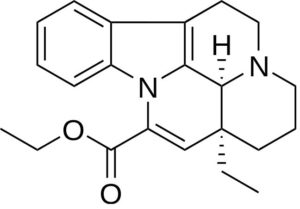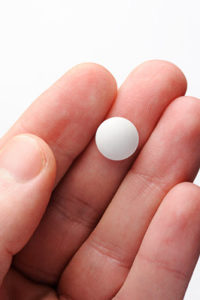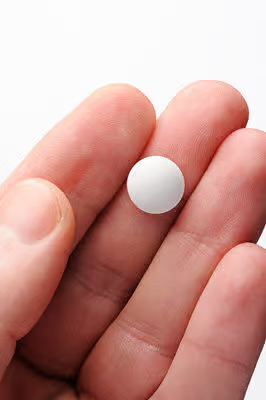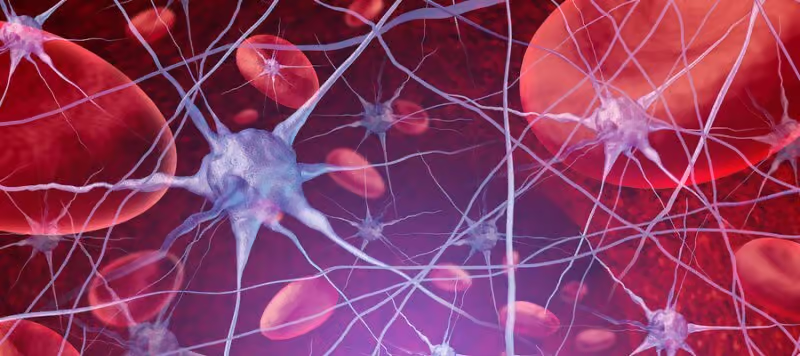Table of Contents
Vinpocetine (periwinkle extract, ethyl apovincaminate, Cavinton, Bravinton, Ceractin, Intelectol) is a semi-synthetic derivative of vincamine, an alkaloid derived from the lesser periwinkle plant (Vinca Minor L.).

Vinpocetine was first isolated from the periwinkle plant in 1975 by chemist Csaba Szántay. Hungarian pharmaceutical company Gedeon Richter began manufacturing Vinpocetine in 1978. Vinpocetine continues to be one of the company’s top selling drugs world-wide.[i]
Vinpocetine is used as a prescription drug in Japan, Europe, Mexico and Russia for the treatment of cognitive and cerebrovascular disorders. In the USA and Canada, Vinpocetine is sold as an OTC dietary supplement.
As a nootropic, Vinpocetine is used primarily to increase cerebral blood flow.
Other uses include using Vinpocetine for the prevention of motion sickness, menopause symptoms, chronic fatigue syndrome, seizure disorders, hearing and eye disorders, and even as a topical application to increase female sexual response.[ii]
Here we’ll investigate Vinpocetine’s value as a nootropic and to optimize cognition.
Vinpocetine helps:
- Cerebral Circulation. Vinpocetine helps boost blood flow to and within the brain. Improving the flow of oxygen and glucose that feed ATP to power brain cells. Improving alertness, cognition, concentration, memory and mood.
- Neuroprotectant. Vinpocetine blocks the accumulation of sodium in neurons, reduces the toxic effects of oxidative stress, inhibits the enzyme PDE1 and boosting blood flow, scavenges free radicals, and protects neurons from glutamate and NMDA toxicity.
- Neuroplasticity. Vinpocetine inhibits the enzyme PDE1 which can increase cAMP and cGMP. These cyclic nucleotides in turn activate a series of kinases that phosphorylate the transcription factors cAMP response element binding protein (CREB) and serum response factor (SRF), leading to the expression of plasticity-related genes.[iii] Boosting neuroplasticity enhances cognition and memory.
Overview
Vinpocetine (Cavinton, Intelectol) is a unique nootropic supplement derived from the lesser periwinkle plant (Vinca Minor).
A flowering plant native to central and southern Europe and Turkey, Vinca Minor is also grown as ground cover in the United States.

Since it was first released in 1978, Vinpocetine has earned a well-deserved reputation with the nootropics community for optimizing cognitive health. Primarily by boosting cerebral blood flow.
But to understand how and why Vinpocetine boosts cognition and protects your brain, we need to dive in to how blood flows in your brain.
An optimized adult brain gets about 1/7th of your heart’s output of blood every minute. Your brain needs this blood flow for a constant supply of glucose, oxygen and other nutrients to keep it functioning properly.
Unlike other organs and muscles in your body, your brain cannot stand an interruption in this steady flow of blood.
Two carotid arteries in the sides of your neck send blood to the front and top of your brain. Arteries in your vertebrae (spine) join with your carotid arteries at the base of your brain to form the Circle of Willis.[iv]
The Circle of Willis is critical because it is the only area of your body where all four major blood vessels join. Allowing blood to be sent to areas where it is needed. Even if one of the major blood vessels becomes blocked.
We’ll take a look at “How things go bad” later in this article. The good news is that Vinpocetine can have a profound effect on maintaining and repairing your brain’s blood vessels, cerebral blood flowing through the Circle of Willis, and to individual brain cells.
Vinpocetine not only helps increase cerebral blood flow, it also works as a powerful antioxidant and anti-inflammatory in your brain.
How does Vinpocetine work in the Brain?
Vinpocetine boosts brain health and function in several ways. But two in particular stand out.
- Vinpocetine boosts cerebral circulation. Your brain only accounts for about 2% of your bodyweight, but it consumes about 20% of the oxygen and nutrients circulating in your blood.[v] This is why strong, healthy cerebral blood flow is so critical to your brain health and cognitive performance.
Vinpocetine inhibits an enzyme called PDE1 (phosphodiesterase type 1) while reducing calcium levels in brain cells. When both of these are elevated, the smooth muscle in blood vessels contract, narrowing the diameter of blood vessels. And restricting blood flow to that area of the brain.
You may be familiar with PDE5 inhibitors like Viagra® which work to dilate blood vessels and maintain healthy blood flow to your penis. Vinpocetine has a similar mechanism of action in your brain.
In two separate clinical studies, chronic ischemic post-stroke patients were treated with either a single infusion, or daily infusion of Vinpocetine for 2 weeks.
Vinpocetine increased cerebral glucose uptake and glucose metabolism in both the stroke region of the patient’s brains as well as the intact brain tissue.
Patients in the 2-week long treatment also showed increased cerebral blood flow especially in the thalamus, basal ganglia and visual cortex regions of the brain.[vi]
- Vinpocetine is an anti-inflammatory. Vinpocetine prevents the upregulation of NFκB (nuclear factor kappa-light-chain-enhancer of activated B cells) by TNFα (tumor necrosis factor alpha).
This sounds a little complicated, but has serious implications in the development of Parkinson’s and Alzheimer’s Disease. Here’s how it works…
NFκB is a protein complex that controls transcription of DNA, cytokine production (signaling protein) and cell survival. TNFα is a signaling protein (cytokine) involved in inflammation produced by neurons. Vinpocetine inhibits this action.
Vinpocetine also reduces the TNFα-induced expression of the mRNA of pro-inflammatory molecules such as interleukin-1β, monocyte chemoattractant protein-1 (MCP-1), and vascular cell adhesion molecule-1 (VCAM-1).
Researchers have found that Vinpocetine prevents this inflammatory response at the cellular nucleus level. And this mechanism of action is independent of Vinpocetine’s action on PDE1.
This is a very big deal because TNFα contributes to the neuronal cell death found in Parkinson’s Disease. And there is growing evidence that the accumulation of amyloid-β protein leads to an upregulation of interleukins and TNFα that contributes to neurodegeneration leading to Alzheimer’s Disease.
Scientists are now working on trying to determine if Vinpocetine can reduce inflammation in the brain. And help protect the brain from developing Parkinson’s or Alzheimer’s.[vii]
How things go bad
Poor cerebral blood flow, inflammation and free radicals (oxidation) can damage your brain. And one of the ways this manifests is memory loss. Left unchecked, it can develop into serious neurodegenerative diseases like Alzheimer’s and Parkinson’s Disease.
↓ Cognitive function declines
↓ Inflammation kills brain cells from the inside
↓ Free radicals destroy neurons and synapses
↑ Anxiety, depression and moodiness increase
↓ Concentration and memory declines
Poor cerebral circulation causes a domino effect in the brain affecting many critical processes. Memory, cognition, and decision-making all suffer as a result.
Vinpocetine benefits
Vinpocetine is one of the most researched nootropics on the planet. It was introduced to clinical practice in Hungary in 1978 for the treatment of cerebrovascular (brain blood flow) disorders and related symptoms.
Since then Vinpocetine has become a “reference compound” in pharmacological research of cognitive deficits caused by hypoxia (oxygen deficiency), ischemia (inadequate blood supply) and research into cyclic nucleotides (cAMP and cGMP).
Vinpocetine’s mechanism of action in the brain includes:
- Increasing brain blood circulation and oxygen utilization
- Increased tolerance for hypoxia and ischemia
- Anticonvulsant activity
- Inhibiting the PDE1 enzyme
- Increasing the pliability of red blood cells
- Inhibiting the aggregation of platelets (blood clots)[viii]
Hundreds of studies in animals and humans have shown Vinpocetine can repair and reverse the effects of damage caused by strokes. Vinpocetine can prevent the inflammation and damage by free radicals that can lead to neurodegenerative diseases like Parkinson’s and Alzheimer’s.
Vinpocetine can improve glucose and oxygen supply to critical brain cells through increased blood flow. Improving cognition, concentration, mental agility, anxiety, depression and memory.
How does Vinpocetine feel?
You should be able to feel the effects of Vinpocetine within an hour of taking it.
Neurohackers report that Vinpocetine reduces brain fog and mental fatigue. Most experience improved focus, memory and even an improved sense of well-being.
Vinpocetine’s effect on short-, working- and long-term memory can be profound. Remembering names, numbers and life events becomes easier.
At work or in school, Vinpocetine can assist in learning and helping your brain commit it to memory. You should feel a significant difference in your ability to focus at work.
And like any nootropic, Vinpocetine is not going to turn back the clock 30 or 40 years. But it will help to keep your brain functioning more smoothly.
Vinpocetine Clinical Research
Vinpocetine Improves Memory
12 healthy female volunteers were treated with 40 mg Vinpocetine 3-times per day, or a placebo, for 2 days in this randomized double-blind crossover study.
On day 3 of the study, and one hour following morning dosage of Vinpocetine, the women completed a battery of psychological tests. The study found that those who used Vinpocetine had a significant improvement in memory when compared to placebo.[ix]
Vinpocetine Repairs Long-Term Potentiation
If you have been having problems with long-term memory lately, this study is for you.
Researchers produced a “medial septal lesion” on rats in the lab. The medial nuclei are an area of the brain composed of medium-size neurons. These neurons receive signals from different areas of your brain including your hippocampus.
A lesion cuts off communication with an important memory-formation area of your brain. The effect of a lesion in this study was on hippocampus function and the long-term potentiation pathway.
The scientists found that damage in this area of the brain negatively affects long-term potentiation. The rats were then given either physostigmine, piracetam, Vinpocetine or Hydergine one hour after the lesion. And once-a-day for 6 days after the operation.
The study found that all of the drugs used in this study produced complete restoration of long-term potentiation. And shows that Vinpocetine is one of the most effective and least expensive ways to restore long-term potentiation and long-term memory formation.[x]
Vinpocetine Enhances Cognitive Performance
A placebo-controlled, randomized double-blind trial was conducted at the University of Surrey with 203 dementia patients using Vinpocetine. Patients received either 10 mg of Vinpocetine 3-times per day, 20 mg of Vinpocetine 3-times per day or a placebo 3-times per day for 16 weeks.
The patients were assessed on cognitive performance and measure of quality of life, including depression. Both Vinpocetine groups experienced a significantly improved cognitive performance score compared to placebo.
The study concluded that Vinpocetine was useful in the management of patients with symptoms of dementia. And there was no statistical difference in cognitive scores with 10 mg or 20 mg of Vinpocetine.[xi]
Vinpocetine Dosage
Vinpocetine has a reputation among neurohackers and in clinical trials for safety at recommended doses.
The recommended dosage for Vinpocetine is 10 mg taken 3-times per day with food. Vinpocetine seems to be more effective when taken with a meal or high quality fat like coconut or olive oil.
You can safely dose up to 60 mg of Vinpocetine per day total. But clinical trials and user experience nearly always report that higher doses provide no added benefit.
Vinpocetine Side Effects
Vinpocetine is well-tolerated and safe for use by most people. But if you’re particularly sensitive to supplements and drugs, try a starting dose of 5 mg of Vinpocetine and see how your body reacts.
If you’re dealing with low blood pressure you should avoid using Vinpocetine. This nootropic affects blood flow not only in your brain, but through your entire system. If you take Vinpocetine and feel light-headed or dizzy it could be a sign your blood pressure is low.
Vinpocetine affects clotting factors in your blood. And may decrease red blood cell platelet aggregation. So if you are using blood thinners or high doses of aspirin you should avoid Vinpocetine.
Stop taking Vinpocetine at least 2 weeks before surgery because of its effect on blood thinning and flow.
The US FDA issued a warning June 2019 stating that women who are pregnant or intend on becoming pregnant should not use Vinpocetine. Because a recent animal study shows that Vinpocetine decreased fetal weight and increased the chances of a miscarriage.
Where to buy Vinpocetine
Vinpocetine usually comes in 5, 10 or 20 mg tablets.
Many countries around the world require a prescription to purchase Vinpocetine. In the USA, the FDA recently added Vinpocetine to its “Dietary Supplement Ingredient Advisory List“.
The FDA says this list, “is intended to quickly alert the public when the FDA identifies ingredients that do not appear to be lawfully included in products marketed as dietary supplements.”
In this instance, Vinpocetine was put on FDA’s list at the request of a major pharmaceutical company who intend to make and market it as a prescription drug. Which means you can no longer buy Vinpocetine from vendors such as Amazon or Bulk Supplements.
I use and recommend: Life Extension – Vinpocetine
Nootropics Expert Recommendation
Vinpocetine 10 mg 3-times per day
 We recommend using Vinpocetine as a nootropic supplement.
We recommend using Vinpocetine as a nootropic supplement.
Your body does not make Vinpocetine on its own. So you must take it as a supplement.
Vinpocetine easily crosses the blood-brain barrier and is available within an hour of taking it. Vinpocetine works more effectively if taken with food.
Vinpocetine is especially helpful for those suffering from brain fog and memory loss. Vinpocetine helps increase cerebral blood flow bringing more oxygen and nutrients to brain cells.
Vinpocetine is helpful for those dealing with stroke recovery. This nootropic helps restore blood flow to damaged areas of the brain affected by stroke. And helps prevent damage caused by the increase in free radicals typically released during stroke recovery.
Vinpocetine is also helpful for those suffering from Alzheimer’s. It has been shown to boost blood flow to areas of the brain affected by amyloid-β protein aggregation. Vinpocetine helps tame inflammation associated with the disease. And studies are now underway to determine if Vinpocetine can prevent Alzheimer’s from taking hold in the first place.
You can safely take up to 60 mg of Vinpocetine daily if needed. One dose first thing in the morning. One dose early afternoon. And the last dose in the evening.
And for memory, Vinpocetine is great to stack with most of the racetams. Neurohackers report good success stacking Vinpocetine with Gotu Kola.
I use and recommend: Life Extension – Vinpocetine









Join The Discussion - 173 comments
Larry Trowbridge
June 6, 2019
In light of today’s email message about Vinpocetine and the “fake news” reporting on it’s “supposed” side effects, is this a sign that stocking up may become necessary? If so, how soon might that be? Also, if the FDA caves to ‘Big Pharma’, would maritime pine-bark be a good substitute?
David Tomen
June 6, 2019
Larry, I wish I had stock in a company that produced Vinpocetine. Because then I’d tell you to ‘stock up’. But I don’t and no one has an answer to your question. Except possible the executives in whichever pharmaceutical company is gearing up to put their Vinpocetine drug on the market.
Pine Bark Extract is a good option for boosting cerebral blood flow. I personally find Vinpocetine works better for me but if I didn’t have it then I’d use Pine Bark Extract.
Larry Trowbridge
June 6, 2019
Interesting. The reason I asked about pine bark was that I bought some Mind Lab Pro and was taking it for about a month. I was having some pretty bad heartburn and I narrowed it down to the MLP (because of the timing of when it started) so I stopped taking it, and sure enough, the heartburn stopped within a day or so. The only ingredient in MLP that I don’t recall ever using was the pine bark. I’m going to start taking it again tomorrow and see if the heartburn returns. If it does, I’m going to try rounding up all the ingredients in MLP and see if replacing the pine bark with vinpocetine will help. If not, I suppose I could swap things out until I find the culprit. Any other suggestions on dealing with heartburn?
David Tomen
June 9, 2019
Larry, haven’t heard before that MLP caused ‘heart burn’. Whenever I have stomach issues I take a couple of capsules of Ginger of Ginger extract and it settles within minutes.
Larry Trowbridge
June 27, 2019
David, I just wanted to update you on what I just discovered about vinpocetine: I had it as one of my subscribe & save items at “that online store that sells EVERYTHING” 😉 I had a note that Juy’s shipment had an item that was temporarily unavailable; it was vinpocetine. When I clicked on the product link I got a page not found error. I did a search for it and it only returned results like huperzineA and similar items. So basically, vinpocetine has simply vanished from ALL of Amazon. I found some and will be buying as much of it as possible in the next day or so.
Wim
March 21, 2019
Hi David,
I also had the side effects , headache and eye pupil opening, result in strange vision , but they go away once used to it and when taking with food and some other supplements at the same time.
My question:
What blood thinning potency has Vinpocetine compared to aspirin ? For example 100mg aspirin in relation to blood clothing .
I wanted to see if Vinpocetine can balance the blood clothing effect of vitamin K to still get the other benefits of K and avoiding the clothing.
So to use Vinpocetine in place of aspirin against blood clothing and still get the extra benefits of Vinpocetine.
Thanks
David Tomen
March 23, 2019
Wim, Vinpocetine does boost blood flow and anyone with a bleeding disorder shouldn’t use it. I have not seen a direct comparison with Vinpocetine vs. Aspirin. I know for sure that Vinpocetine doesn’t cause stomach bleeding like aspirin. But how it would affects clotting has not been addressed that I’m aware of.
Adil
March 9, 2019
Hi David,
Thanks a lot for your posts.
I’m taking brain lab pro. 4 capsules per day.
Actually, each time, i take the four capsules, I start yawning and feel a bit tired after.
Do you have and idéal?
Many thanks
David Tomen
March 10, 2019
Adil, the recommended dosage for Mind Lab Pro is 2 capsules per day. With a max. of 4 capsules. I suggest either cutting back to 2 capsules in the morning for a few days. Then you may want to experiment with another 2 capsules at noon in addition to your two in the morning.
Feeling tired and yawning after taking this supplement indicates either too much acetylcholine, or too much dopamine. But it’s likely acetylcholine is too high.
Adil
March 10, 2019
Hi David
Thanks a lot for your answer. I’ve an other question: How long to see an improvement by taking 2 tablets a day? should I take the tablets on an empty stomach?
David Tomen
March 10, 2019
Adil, how soon you experience improvement depends on your biology. Some feel the effects of Mind Lab Pro within an hour and some have to use it for a week.
Experience with nootropics shows over and over again that reasonable dosages with consistent use provide the best results.
Peter
March 7, 2019
Hi David I recently have been buying all noo-tropics and health related vitamins but before i ordered them all I picked up some vinpocetine and a probiotic. I also am diagnosed with schizophrenia and PTSD. I highly doubt this is because the probiotic so I figured it was Vinpocetine, I am a little worried about increased blood flow because maybe I already had that under control and most importantly it is giving me some bad side effects under the anxiety/psychosis category, Should I take vinpocetine anymore and try and get used to it or should I stop so it doesnt take me off my health spring… im going to rest now so it goes away. Thanks David for all you do, hopefly you can help
David Tomen
March 8, 2019
Peter, I’m not sure I understand what you are saying. Vinpocetine or a probiotic will not “cause” schizophrenia or PTSD. Early research shows that Vinpocetine may help schizophrenia by inhibiting PDE1 (https://www.ingentaconnect.com/content/ben/cpd/2015/00000021/00000026/art00012). This nootropic helps boost blood flow and if anything would tend to lower blood pressure rather than cause it to increase.
There may be some other mechanism of action in either Vinpocetine or the probiotic that could be causing your symptoms. The general rule of thumb is if you try a nootropic and experience a negative effect then stop using it.
Dan Oshima
March 4, 2019
Mr. Tomen, with the death of Luke Perry today of stroke at the age of 52 (my age), it got me thinking that I’d like to do all I can to prevent it. I realize it’s a complex issue and many factors would be involved in lowering the risk, but in your opinion would Vinpocetine be one of the better nootropics that would mitigate risk of stroke? Any others?
David Tomen
March 4, 2019
Dan, Vinpocetine is certainly one great option. But there are other ways our brains age which is investigated in the following post. And will provide some other longevity options for you: https://nootropicsexpert.com/best-nootropics-for-the-aging-brain/
silvergymnasium
November 28, 2018
What is the best brand to get?
David Tomen
November 28, 2018
I now get my Vinpocetine from Life Extension: https://nootropicsexpert.com/go/life-extension-vinpocetine/
Farooq
November 28, 2018
Dear David,
thanks a lot for the detailed article.
You have mentioned that Vinpocetine prevent inflammation that could cause Parkinson’s disease. My question is that whether it can help someone who has already been diagnosed with Parkinson?
David Tomen
November 28, 2018
Farooq, studies show that the progression of Parkinson’s could be due at least in part to inflammation: https://www.ncbi.nlm.nih.gov/pubmed/19296921/. So it would make sense that taming inflammation with something like Vinpocetine should help slow disease progression: https://www.ncbi.nlm.nih.gov/pmc/articles/PMC2890434/
Paul
November 10, 2018
Hi David,
Could vinpocetine cause headaches due to increase blood flow? Just asking since I am considering it for my sons who are non verbal and cannot express if they have headaches. I am looking to use to help gain cognition, speech and help with inflammation.
Thank you
David Tomen
November 11, 2018
Paul, I’m not aware of headaches as a side effect of Vinpocetine. But it this is a concern and you’re looking to boost cerebral circulation you may want to consider Pine Bark Extract instead: https://nootropicsexpert.com/pine-bark-extract-pycnogenol/